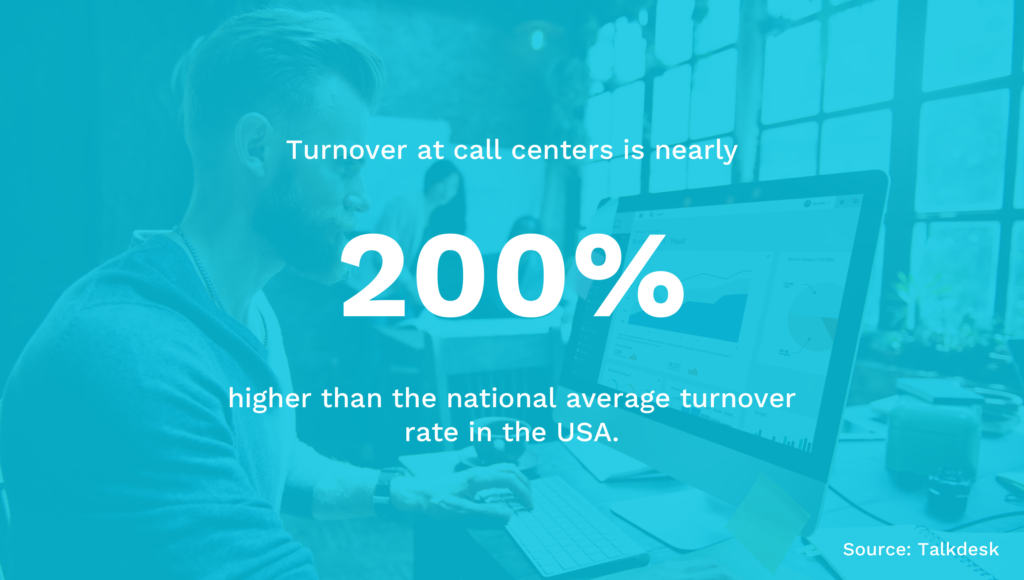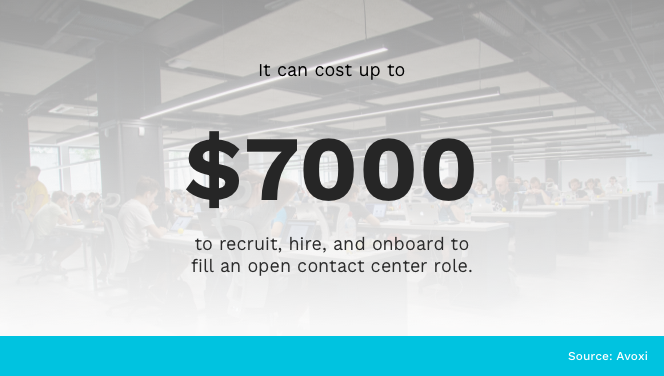If your goal is to provide the best possible customer service, the only way you can achieve that is by hiring high-quality customer support staff. In order to do this, you’ll need to be able to accurately assess if candidates have the right skill set.
The solution: Including a contact center simulation test as part of your recruitment process.
Sounds simple, right?
Creating and executing a contact center simulation might sound straightforward, but it can be challenging to ensure that it is effective, measures the right skills, and provides a positive candidate experience.
What’s in?
Like what you see?
Don’t miss out. Subscribe to our quarterly digest to get the latest TA and TM resources delivered right to your inbox.
What’s a Contact Center Simulation Test?
Put simply; it’s a fully immersive job simulation exercise that shows your candidate the job and shows you if they’re well suited for the role. As the recruiter, the simulation allows you to evaluate how potential candidates respond to challenging situations in a virtual environment.
For instance, you might ask potential employees to handle common job tasks, like responding to an angry customer or asking them to take over a support request from a chatbot.
Not only can you use simulation tests to assess how the candidate handles day-to-day tasks, but you can also get a feel for:
- How they would interact with other call center staff
- If they have the personality fit, attitude and attention to detail
- Their communication style and skill level
- Multi-tasking and problem solving abilities
… and more!
All in all, testing with a job simulation provides more relevant insight into your candidates than a resume or interview. Why? Because sometimes a candidate looks great on paper and has great interview skills but behaves differently when they’re faced with the realities of the job.
For example, encountering an aggressive or abusive customer is much different in reality than it seems in a behavioral interview question. That’s why job simulations are the strongest way to predict if a candidate is a great fit.
Hire better live chat agents, at scale.
Dive into the rise of live chat, the skills of top-performing agents, and how to best assess them to reduce attrition and guarantee top-notch customer service.

What Are The Benefits of Simulation Testing?
Besides being a great selection tool, work simulation tests also provide data about your candidate’s skills and behaviors that can help you improve the efficiency and fairness of your process.
If you’ll be assessing a large number of candidates, it can be hard to provide a personalized experience at scale. But, if you gather information from a skill assessment or job simulation, you’ll always be able to find a candidate’s details to make data-driven hiring decisions. If candidates are selected using a uniform process, you’ll be able to easily reduce bias in your recruitment process and deliver a consistent and fair hiring experience.
Simulation tests can also help reduce your contact center attrition rate. When you give applicants a realistic preview of what awaits them if they get the job, you give them an option to self-select out of the job, avoiding costly early attrition. This way, you’ll be able to effectively manage candidate expectations while finding if they have the skills you need.
Simulation tests ultimately benefit the most influential people in this situation: your customers. By recruiting the right hires the first time around, you’re providing customers with a better experience with your brand, which is imperative for inspiring your consumers’ trust and confidence.
Now you’ve read about some of the benefits of contact center simulation testing, let’s dive into how you can make it work for you.
1. Make it Relevant
When you’re running a simulation, ensure it’s 100% relevant to the job you’re recruiting for. The test must assess the essential skills and characteristics for success in the job, while providing an accurate representation of the role.
For example, if you’re recruiting for call center staff to work for a bank, hires should be tested on their numeracy skill in addition to customer service and attention to detail. Keeping your tests laser-focused on key skills of the position you’re looking to fill ensures the test will actually be predictive of success.
2. Check it’s Validated
Ensure your simulation test is scientifically validated and created by a reputable company with a strong track record for designing different simulation tests relevant to your industry. A validated assessment allows you to make data-driven, efficient, and objective decisions that are fair and defensible.

3. Make it Engaging and Immersive
Your candidates will enjoy a more interesting and engaging experience if you provide a varied and interactive simulation test. For example, you could use a video-based situational judgment test and incorporate an interactive live chat assessment too. After all, increasing numbers of consumers are interacting with companies online. So, it’s no wonder live chat is a fast-growing communication method amidst contact centers around the world.
Plus, with an interactive live chat assessment, not only are you testing multitasking skills, but also their response times, grammar, language, and typing abilities. This is especially helpful if you’re hiring agents who will have to use multiple communication platforms as part of their job.
4. Make it Realistic
Not only should your simulation test be relevant, but it should also be realistic. By this, we mean your test should closely mimic the realities of the job and your working environment. After all, candidates want to know exactly what the job entails, how stressful it is, and what your company culture’s actually like. And you can use a simulation test to provide valuable information to them.
For example, suppose your call center agents have to regularly deal with demanding customers with often complex queries or problems. In that case, the simulation test needs to reflect the trying nature of the task at hand. Similarly, if call center agents regularly face stressful situations with customers, such as chasing people for unpaid debts, ensure candidates experience a simulated version of this scenario. This is imperative both to accurately predict job performance and to reduce early attrition.
Stop guessing,
Start data-driven hiring.
Learn how you implement a modern candidate selection process, that is: streamlined, experience-driven and backed by data.

5. Customize Your Simulation
The most successful simulation is one that’s customized to your organization, rather than coming right off the shelf. That’s because, as mentioned above, the test needs to reflect the types of customers potential hires will deal with and include real-life situations they’ll encounter.
A customized simulation will help you find the right mix of agents to meet your call center’s specific offerings and skill needs. For example, if a role requires lots of call transcription, it’s important to measure a candidate’s ability to type quickly and accurately. Or, if your agents primarily deal with angry customers, you’ll need to find someone with strong problem-solving and high stress tolerance, in addition to great customer service.
Compared to a standard call center simulation test, a customized assessment helps you to more accurately predict how someone will perform in your unique roles, while giving them the best possible information to decide if it’s right for them.

6. Improve Over Time
Once you have your simulation testing in place, it’s important to remember to refine it over time to accurately reflect your organization’s evolving needs. If your contact center takes on new clients or acquires a new business segment, your situational tests need to reflect these changes.
One way to keep your finger on the pulse is to compare your hired agents’ assessment results against their actual job performance to see if it accurately predicts candidate success on the job. If, after analysis, you find your simulation tests aren’t hitting the mark, you can tweak them to better assess for the behaviors and skills you’re looking for.
7. Combine With Other Assessments
It’s wise to combine your simulation tests with other types of assessments, like a keystrokes per hour test. Otherwise, you’ll limit the information you have to drive decisions. For example, contact center agents sometimes need to utilize other skills, like:
- Typing skills
- Data entry
- Grammar & spelling
- Spoken language proficiency
Or, you can leverage a scientifically validated personality test can help you discover your candidates’ likes, dislikes, and behaviors such as:
- Agreeableness
- Conscientiousness
- Honesty
- Integrity
- Openness to experience
- Emotional intelligence
The more robust your assessment, the better you’ll be able to ensure that the qualities you’re testing are those that are needed for your call center.
Are You Ready to Start Running High-Quality Contact Center Simulation Tests?
If used correctly, your contact center simulation tests will help you hire the right agents for your contact center. When combined with other reputable and measurable forms of assessment, simulation tests will help you screen your applicants and give you objective data on the skillset you’re looking for.
Remember, your call center staff are your brand ambassadors. They’re your gateway to providing your consumers with grade A customer experience and satisfaction.
Not only do your potential hires experience the realities of the job they’re applying for, but they’re also empowered and motivated to learn more about the role. This is imperative for encouraging candidates to perform above and beyond the standards you expect from them.
Experience our best-in-class Live Chat Assessment first-hand!
Perfect for remote hiring, our live chat assessment makes it easier than ever to hire live chat agents. Candidates experience the job, while you get actionable data to drive hiring decisions.


